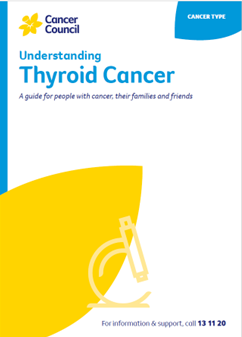- Home
- Thyroid cancer
- Treatment
- Active surveillance
Active surveillance for thyroid cancer
In some cases, your doctor may recommend closely monitoring the cancer, rather than having treatment straightaway. This approach is known as active surveillance. It usually involves regular ultrasounds and physical examinations.
There is good evidence that active surveillance is safe for small papillary thyroid cancers when there is no sign that the cancer has spread from the thyroid. It may be an option when the tumour is under 10 mm, isn’t causing any symptoms and is considered to be low risk.
If you choose active surveillance, a specialist thyroid radiologist will need to map the tumour. Your doctor may suggest that cancers close to muscle, the vocal nerve, trachea or oesophagus be treated with surgery.
Some people choose active surveillance if treatment side effects would make them feel worse than the cancer itself. Other people are worried or stressed by the idea of active surveillance and want to have treatment straightaway. Some people – especially those who are younger – may not want to commit to having lifelong checks and appointments. You can usually start treatment at any stage if you change your mind about having active surveillance, or if the cancer grows or spreads.
If you agree to having active surveillance, your doctor will talk to you about what changes to look out for.
→ READ MORE: Surgery for thyroid cancer
Podcast: Making Treatment Decisions
Listen to more of our podcast for people affected by cancer
More resources
A/Prof Diana Learoyd, Endocrinologist, GenesisCare North Shore, Faculty of Medicine and Health, University of Sydney, NSW; Emeritus Professor Leigh Delbridge AM, The University of Sydney, Thyroid Surgeon, The Mater and North Shore Private Hospitals, NSW; Prof Ruta Gupta, Tissue Pathology and Diagnostic Oncology, Royal Prince Alfred Hospital and The University of Sydney, NSW; Susan Leonard, Cancer Nurse Coordinator Thyroid and Brachytherapy, Cancer Care Services, Royal Brisbane and Women’s Hospital, QLD; Dr Dean Lisewski, Endocrine and General Surgeon, Fiona Stanley Hospital and St John of God Hospital, Murdoch, WA; Caitriona Nienaber, 13 11 20 Consultant, Cancer Council WA; Jonathan Park, Consumer; A/Prof David Pattison, Deputy Director and Senior Staff Specialist, Department of Nuclear Medicine and Specialised PET Services, Royal Brisbane and Women’s Hospital and School of Medicine, University of Queensland, QLD; Prof Bruce Robinson, Endocrinologist, Co-Head, Cancer Genetics, Kolling Institute of Medical Research, The University of Sydney and Royal North Shore Hospital, NSW; Marissa Ryan, Team Leader (Cancer) Pharmacist, Princess Alexandra Hospital, Brisbane, QLD.
View the Cancer Council NSW editorial policy.
View all publications or call 13 11 20 for free printed copies.
Need to talk?
Support services
Coping with cancer?
Ask a health professional or someone who’s been there, or find a support group or forum
Online Community
Check out this supportive online community for people affected by cancer
Cancer information
Making cancer treatment decisions
Decision-making steps, consent and second opinions
Deciding on specialist care
How to find and choose a surgeon, oncologist or other specialist

